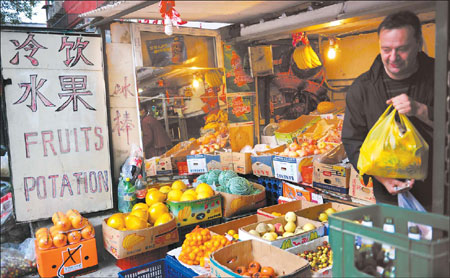As the global financial crisis threatens to poison lives around the globe, many expatriates in China are finding they are largely immune to its toxicity.
And generally speaking, the fewer economic ties they have to back home, the safer they are, says renowned economist Liu Baocheng, director of the Center for International Business Ethics, a nongovernmental organization hosted by the University of International Business and Economics in Beijing.
Liu reckons that "most foreigners have good reason to be confident about their lives in China" but that there are often differences between "full expats" - those sent by multinationals - and "local expats" - those who work for Chinese employers.
"If they work for a Chinese company or organization and earn RMB, they're better off," he explains.
"The other category - those paid from home and sent as expats - may feel a more negative impact."
|

|
|
A foreigner steps out of a Beijing fruit stand with his just-purchased items. The RMB has largely survived the hit that other currencies have suffered. [AFP]
|
Still, the pain felt by full expats is usually softer than if they were working for the same firms back home. "For many US companies, their China operations are enjoying greater success than their headquarters," he says.
He cites Lehman Brothers as an example. The company's China operation has chugged along as a revenue engine during its infamous crash, boding well for expats here.
Nigel Clark, chairman of the British Chamber of Commerce in China, says the impact of the crisis on his compatriots in China varies but "on balance the effect is likely to be less for those living here".
"Most expatriates living in China are enjoying working in a vibrant economy," says Clark, "but the effect will vary by individual and family, depending on their age group and how they have positioned themselves regarding past and future financial arrangements, particularly retirement".
Furthermore, while several overseas currencies have wobbled of late, the RMB has been appreciating.
This is of great relief to Australian Daniel Sanderson, who has lived in China for five years and works for his homeland's embassy in Beijing.
"The only way it (the crisis) would affect me is if the Australian dollar goes down. I get paid in RMB, so I'm actually making more money," he says.
In addition, China's Consumer Price Index (CPI) remains stable and generally low, while expat wages remain relatively high, says Liu.
"Expats on average earn three to five times more than their Chinese colleagues and enjoy the same low prices for commodities and services," he says.
As American Jarrod Wolf puts it: "A hundred kuai goes a long way here."
However, the 20-year-old university student says he's saving cash, because he doesn't know what will happen after he returns home in three months.
"It's not that my purchasing power has decreased, but I'm more (careful) about how I spend my money," he says.
"I would go out and do a lot more things in Beijing but I don't know how long or how deep the recession will be back home."
Some who repatriate might even find the economic bust could boost their opportunities in their native economies.